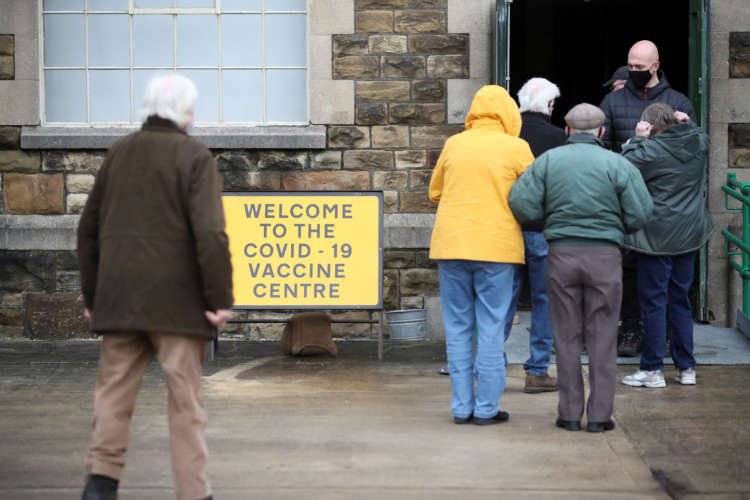Not company earnings, not data but vaccines now steering investor sentiment
Published by linker 5
Posted on January 22, 2021
4 min readLast updated: January 21, 2026

Published by linker 5
Posted on January 22, 2021
4 min readLast updated: January 21, 2026

By Marc Jones and Dhara Ranasinghe
LONDON (Reuters) – Forget economic data releases and corporate trading statements — vaccine rollout progress is what fund managers and analysts are watching to gauge which markets may recover quickest from the COVID-19 devastation and to guide their investment decisions.
Consensus is for world economic growth to rebound this year above 5%, while Refinitiv I/B/E/S forecasts that 2021 earnings will expand 38% and 21% in Europe and the United States respectively.
Yet those projections and investment themes hinge almost entirely on how quickly inoculation campaigns progress; new COVID-19 strains and fresh lockdown extensions make official data releases and company profit-loss statements hopelessly out of date for anyone who uses them to guide investment decisions.
“The vaccine race remains the major wild card here. It will shape the outlook and perceptions of global growth leadership in 2021,” said Mark McCormick, head of currency strategy at TD Securities.
“While vaccines could reinforce a more synchronized recovery in the second half (2021), the early numbers reinforce the shifting fundamental between the United States, euro zone and others.”
The question is which country will be first to vaccinate 60%-70% of its population — the threshold generally seen as conferring herd immunity, where factories, bars and hotels can safely reopen. Delays could necessitate more stimulus from governments and central banks.
Patchy vaccine progress has forced some to push back initial estimates of when herd immunity could be reached. Deutsche Bank says late autumn is now more realistic than summer, though it expects the northern hemisphere spring to be a turning point, with 20%-25% of people vaccinated and restrictions slowly being lifted.
But race winners are already becoming evident, above all Israel, where a speedy immunisation campaign has brought a torrent of investment into its markets and pushed the shekel to quarter-century highs.
(Graphic: Vaccinations per 100 people by country, https://fingfx.thomsonreuters.com/gfx/mkt/azgvolalapd/Pasted%20image%201611247476583.png)
SHOT IN THE ARM
Others such as South Africa and Brazil, slower to get off the ground, have been punished by markets.
Britain’s pound meanwhile is at eight-month highs versus the euro which analysts attribute partly to better vaccination prospects; about 5 million people have had their first shot with numbers doubling in the past week.
Shamik Dhar, chief economist at BNY Mellon Investment Management expects double-digit GDP bouncebacks in Britain and the United States but noted sluggish euro zone progress.
“It is harder in the euro zone, the outlook is a bit more cloudy there as it looks like it will take longer to get herd immunity (due to slower vaccine programmes),” he added.
The euro bloc currently lags the likes of Britain and Israel in terms of per capita coverage, leading Germany to extend a hard lockdown until Feb. 14, while France and Netherlands are moving to impose night-time curfews.
Jack Allen-Reynolds, senior European economist at Capital Economics, said the slow vaccine progress and lockdowns had led him to revise down his euro zone 2021 GDP forecasts by a whole percentage point to 4%.
“We assume GDP gets back to pre-pandemic levels around 2022…the general story is that we think the euro zone will recover more slowly than US and UK.”
The United States, which started vaccinating its population last month, is also ahead of most other major economies with its vaccination rollout running at a rate of about 5 per 100.
Deutsche said at current rates 70 million Americans would have been immunised around April, the threshold for protecting the most vulnerable.
Some such as Eric Baurmeister, head of emerging markets fixed income at Morgan Stanley Investment Management, highlight risks to the vaccine trade, noting that markets appear to have more or less priced normality being restored, leaving room for disappointment.
Broadly though the view is that eventually consumers will channel pent-up savings into travel, shopping and entertainment, against a backdrop of abundant stimulus. In the meantime, investors are just trying to capture market moves when lockdowns are eased, said Hans Peterson global head of asset allocation at SEB Investment Management.
“All (market) moves depend now on the lower pace of infections,” Peterson said. “If that reverts, we have to go back to investing in the FAANGS (U.S. tech stocks) for good or for bad.”
(GRAPHIC: Renewed surge in COVID-19 across Europe – https://fingfx.thomsonreuters.com/gfx/mkt/xegvbejqwpq/COVID2101.PNG)
(Reporting by Dhara Ranasinghe and Marc Jones; Additional reporting by Karin Strohecker; Writing by Sujata Rao; Editing by Hugh Lawson)
Explore more articles in the Investing category











